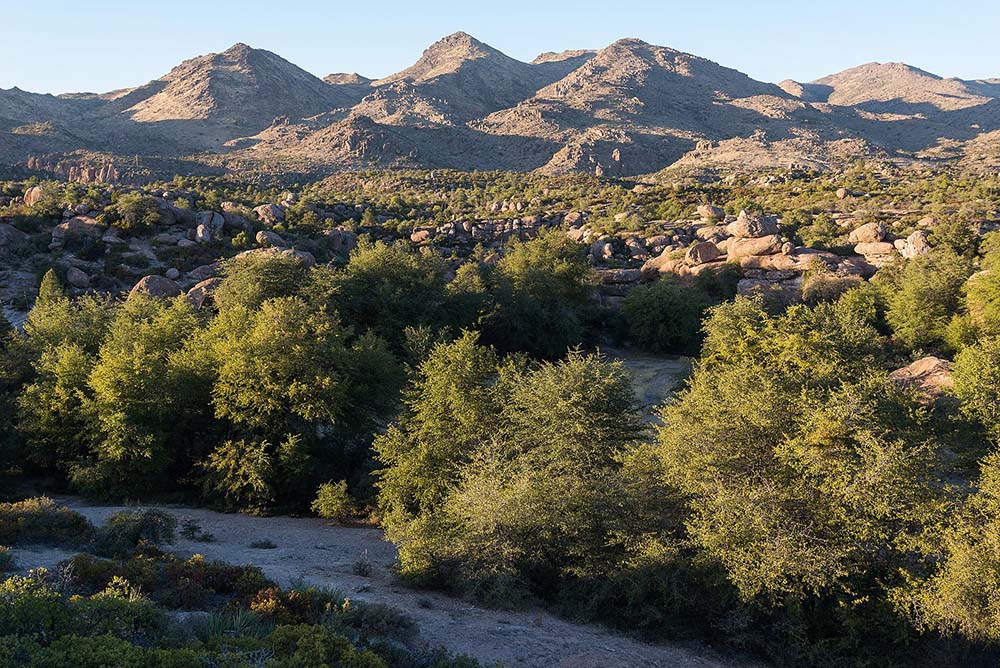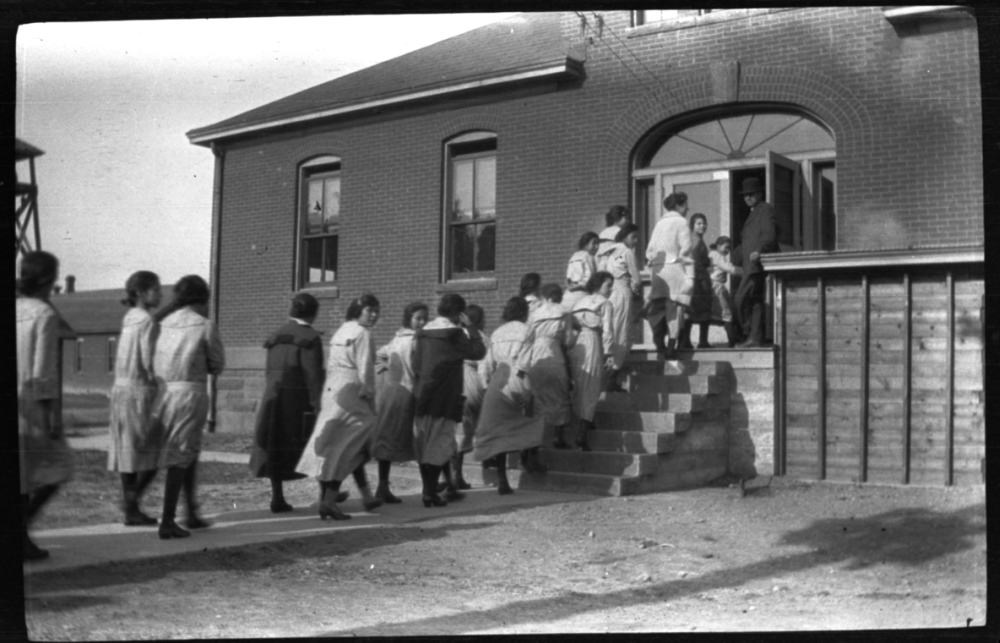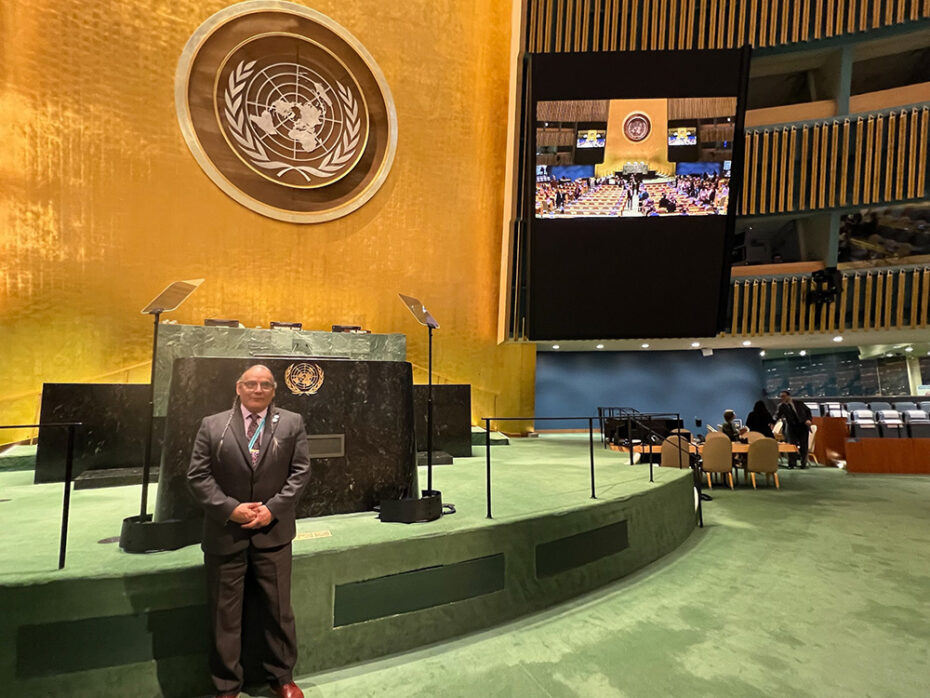April 17, 2023
New York, New York – Greetings, Chair and Excellencies. Thank you for the opportunity to address the Forum. I am Councilman Marvin Weatherwax of the Blackfeet Tribal Business Council. I also serve as the Chairman of the Coalition of Large Tribes, representing the interests of the more than 50 tribes that have reservations of 100,000 acres or more. These tribes govern more than 95% of Indian Country lands in the United States and serve approximately one million Native American citizens. I also serve as a Representative in the Montana State Legislature and on the Blackfoot Confederacy Council that spans the U.S./Canada border. Thank you to the United Nations for the opportunity to speak on behalf of our Indigenous Nations to address continuing attacks on our Treaties and Sovereignty.
Understanding that this year’s Session is devoted to health, we welcome the Forum’s study,
“Indigenous Determinants of Health in the 2030 Agenda,” and also its study on “Free, Prior, and
Informed Consent.”
We are deeply concerned about health on reservations, including spiritual health for our
people. We request your attention to social determinants of health on our Reservations, including
inter-generational harm caused by boarding schools, the Missing and Murdered Indigenous People
epidemic, behavioral health, inadequate public safety and continued threats to our sacred sites and
culture. Unfortunately States, including the U.S., are still failing to take responsibility for these
problems.
Cross Border Issues
While the right to travel, visit family, and access resources is guaranteed by both the Jay
Treaty and Article 36 of the United Nations Declaration, our members often face difficulties,
including inappropriate and insensitive searches by law enforcement and intrusion into sacred
objects by border personnel. The spiritual health for our people is impeded by lack of access or
difficult access to sites and resources in Canada. The United States must do a much better job
training border officers about our rights to cross the border for spiritual purposes and to respect—
and never roughly handle as they routinely do—sacred objects that we transport across the
international border.
Sacred Sites
Of equal concern is the United States’ continued allowance and facilitation of the outright destruction of sacred sites, such as Oak Flat, sacred to the Apache people of Arizona, which the U.S. Department of Justice has argued may be lawfully entirely destroyed for copper mining. Just weeks ago, DOJ attorneys told the Ninth Circuit Court of Appeals that the United States would not even wait for the adjudicative process to be completed, but would instead proceed immediately to actions that wholly destroy certain Native peoples’ religion, violative of the UN Declaration on Human Rights Article 8.

The United States Border Agencies’ tolerance for destruction of Native sacred sites and religions is inconsistent with the Indigenous Peoples Declaration’s Article 3 right to self-determination. Religious and cultural freedom are critical components of Indigenous peoples’ self-determination. These rights are both individual and collective, such that harms to the entire group must be considered alongside limitations on individual practitioners.
More specifically under Article 11, “Indigenous peoples have the right to practice and revitalize their cultural traditions and customs,” and under Article 12, “Indigenous peoples have the right to manifest, practice, develop and teach their spiritual and religious traditions, customs and ceremonies; the right to maintain, protect, and have access in privacy to their religious and cultural sites.”
The United States violates these Articles on a routine basis.
Public Safety
We are also very concerned about other social determinants of health on our Reservations, including public safety, missing and murdered Indigenous people, behavioral health access, and lack of healing resources to address the inter-generational trauma caused by federal Indian boarding schools, such as returning the original land taken for such schools and supporting language and culture restoration.
There is no greater offender of tribal rights in the United States right now than the United States Department of Justice. For example, just in the last year, DOJ has taken positions in federal court to argue that the United States bears no responsibility for the rape of a Northern Cheyenne woman in her home on the Northern Cheyenne Reservation by an on-duty federal law enforcement officer, violative of Article 7 (and also violative of the UN Declaration on Human Rights Articles 1, 3, and 5).
There is paltry law enforcement on many COLT reservations. For example, the nearly 700,000-acre Fort Belknap Indian Reservation in north central Montana is served by just three Bureau of Indian Affairs officers to meet the needs of approximately 5,000 residents. Not three per shift. Three total. Violence and drug trafficking proliferate in that kind of environment. Many of our Reservations are havens for methamphetamine and fentanyl and some of our people are addicted and dying. Again, these are violations of Article 7.
The United States’ Continuing Failure to Honor Treaties
In another example of DOJ opposition to tribes, just last month, an Assistant to the Solicitor General argued forcefully to the United States Supreme Court that the federal government has no duty to do anything to ensure the Navajo Nation’s Treaty and Reserved rights to water. COLT member tribes, including the Navajo Nation, govern vast swaths of the West, but do so largely with at least one hand veritably tied behind our backs because of our uncertain water rights. In such a wealthy country, too many of our people do not have running water and/or must haul water over significant distances to their homes and yet the United States DOJ disclaims any responsibility.
Indian Boarding Schools Land Back
While the United States has made recent strides to repudiate its longstanding assimilationist Federal Indian Boarding School Policy detailed in the Department of the Interior’s May 2022 Federal Indian Boarding School Initiative Investigative Report, the United States has failed to address the mass dispossession of Indians of our lands occasioned by the Indian Boarding Schools Policy even though there are federal laws on the books that require reversion of those lands. The Rapid City Indian Boarding School is an example. The Department of the Interior has had tribes’ requests for statutorily-mandated reversion of the land for nearly two years, but has done nothing.

The lands wrongfully taken from Tribes in support of Federal Indian Boarding Schools are valuable, are sites of unimaginable suffering, and should be returned to Tribes to help us address the many intergenerational social ills from which we still suffer caused by the Federal Indian Boarding Schools.
Federal law already provides “said lands shall revert to the Indian owners.” We call on the United States to make these land returns now, as the Federal Indian Boarding Schools Policy was grossly violative of Articles 8 and 10, and continued inaction perpetuates the damage caused by those violations.
Likewise, while Secretary Haaland has toured the nation listening to endless days of horror stories from Boarding School survivors and the descendants of victims, detailing physical, sexual and emotional abuse and even murder, the United States has failed to provide resources for healing. The federal government has exposed the deep wounds and Native people have an immediate and just right to healing resources under Article 11.
We call on the U.S. to take measures to support our tribes’ health in these areas, including calls on member States, such as the United States, to provide adequate funding for Native law enforcement, healthcare, education and especially trauma healing, as required by federal law and Articles 11, 21 and 23 of the UN Declaration. We call for the immediate return of Federal Indian Boarding School lands to tribes consistent with Articles 10 and 11.
As a global community, it is time to provide justice, truth and reconciliation to indigenous peoples and provide much needed resources for their collective healing.
We are grateful for your support.
Media Contacts
COLT Chairman Marvin Weatherwax – (406) 845-5477, mweatherwax@blackfeetnation.com
COLT Vice Chairman Tracy Ching King – (406) 399-1990, ching.king@ftbelknap.org
COLT Executive Director OJ Semans – (605) 828-1422, tateota@hotmail.com

